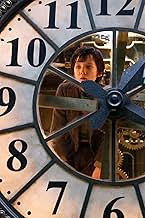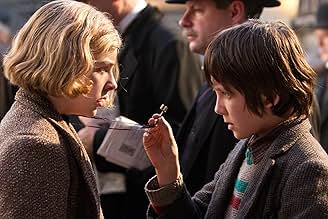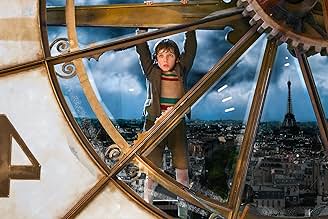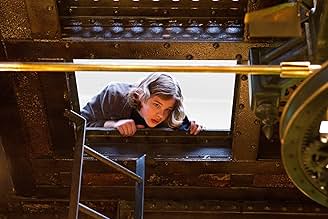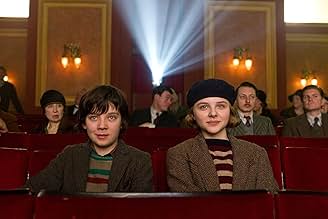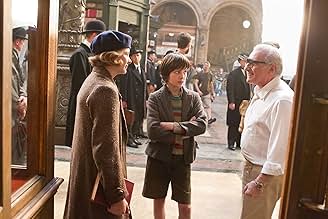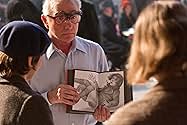Em Paris, em 1931, um órfão chamado Hugo Cabret, que mora em uma estação de trem, está envolvido em um mistério relacionado ao falecimento do pai e a um boneco.Em Paris, em 1931, um órfão chamado Hugo Cabret, que mora em uma estação de trem, está envolvido em um mistério relacionado ao falecimento do pai e a um boneco.Em Paris, em 1931, um órfão chamado Hugo Cabret, que mora em uma estação de trem, está envolvido em um mistério relacionado ao falecimento do pai e a um boneco.
- Direção
- Roteiristas
- Artistas
- Ganhou 5 Oscars
- 61 vitórias e 193 indicações no total
- Direção
- Roteiristas
- Elenco e equipe completos
- Produção, bilheteria e muito mais no IMDbPro
Avaliações em destaque
It has taken me a long time to get round to watching Hugo, but I am so glad that I did. This is a wonderful and simply glorious ode to early cinema told through the eyes of Hugo (Asa Butterfield), an orphan who after the death of his clockmaker father (Jude Law) ends up living in the walls of a Parisian train station charged with winding the station's numerous clocks.
Hugo's only link back to his late father is through a majestic mechanical automaton, a sort of tin man which his father had been restoring in his spare time. As appears to be the way with all tin men this one is also missing a heart, but this time it is a heart shaped key which Hugo is convinced if he can find will unlock the secrets inside. This leads young Hugo on a dangerous but adventurous search which often lands him in the clutches of either the local shopkeeper (Ben Kingsley) or the Station Inspector (Sacha Baron Cohen). Help is at hand though from the shopkeeper's god daughter Isabelle (Chloe Grace Moretz) and as the two join forces they soon discover they have more in common than they thought.
In Hugo, Scorsese has produced a truly magical tale which sucks the viewer into the screen via the innovative use of 3D so immersing us within the dynamics of Parisian life and the wonders that take place within the walls of the station. Butterfield is perfectly cast as young Hugo, a curious young boy determined to survive in a hard and cold world which constantly seems to deal him a bad hand; you simply can't help but love him. Moretz after a slightly shaky start soon finds her feet (and her accent), Kingsley is excellent, especially as the story develops and there is strength in depth from a top notch supporting cast including Emily Mortimer, Ray Winstone and Christopher Lee to name but a few.
Hugo's strength however is in its story, which effortlessly unfolds in front of you with real grace and elegance. Scorsese's love for the history of his craft and his desire to share this tale of early cinema is evident in every frame. Whilst it may not be the most historically accurate portrayal of cinematic history it has a true and good heart which beautifully captures the essence of what is cinema.
Some people have criticised Scorsese for creating a children's movie that is inaccessible for most children. I strongly disagree on this point. To me Hugo is a classic children's movie which works across all age spectrums, much in a similar vain to Spielberg's ET. In a world of Woody, Buzz, Jessie and meatballs that fall from the sky (which don't get me wrong are all fabulous in their own right), it is refreshing to see a children's movie of old. It feels like a magical Christmas movie to me, perfectly accessible and enjoyed by all.
Hugo is fully deserving of the many accolades that it picked up during the awards season. It is a wonderful and engaging film which I will show my children when they are a little older and I am certain they will fall in love with cinema in the same way their father need did so many years ago.
Review by Will Malone www.maloneonmovies.com
Hugo's only link back to his late father is through a majestic mechanical automaton, a sort of tin man which his father had been restoring in his spare time. As appears to be the way with all tin men this one is also missing a heart, but this time it is a heart shaped key which Hugo is convinced if he can find will unlock the secrets inside. This leads young Hugo on a dangerous but adventurous search which often lands him in the clutches of either the local shopkeeper (Ben Kingsley) or the Station Inspector (Sacha Baron Cohen). Help is at hand though from the shopkeeper's god daughter Isabelle (Chloe Grace Moretz) and as the two join forces they soon discover they have more in common than they thought.
In Hugo, Scorsese has produced a truly magical tale which sucks the viewer into the screen via the innovative use of 3D so immersing us within the dynamics of Parisian life and the wonders that take place within the walls of the station. Butterfield is perfectly cast as young Hugo, a curious young boy determined to survive in a hard and cold world which constantly seems to deal him a bad hand; you simply can't help but love him. Moretz after a slightly shaky start soon finds her feet (and her accent), Kingsley is excellent, especially as the story develops and there is strength in depth from a top notch supporting cast including Emily Mortimer, Ray Winstone and Christopher Lee to name but a few.
Hugo's strength however is in its story, which effortlessly unfolds in front of you with real grace and elegance. Scorsese's love for the history of his craft and his desire to share this tale of early cinema is evident in every frame. Whilst it may not be the most historically accurate portrayal of cinematic history it has a true and good heart which beautifully captures the essence of what is cinema.
Some people have criticised Scorsese for creating a children's movie that is inaccessible for most children. I strongly disagree on this point. To me Hugo is a classic children's movie which works across all age spectrums, much in a similar vain to Spielberg's ET. In a world of Woody, Buzz, Jessie and meatballs that fall from the sky (which don't get me wrong are all fabulous in their own right), it is refreshing to see a children's movie of old. It feels like a magical Christmas movie to me, perfectly accessible and enjoyed by all.
Hugo is fully deserving of the many accolades that it picked up during the awards season. It is a wonderful and engaging film which I will show my children when they are a little older and I am certain they will fall in love with cinema in the same way their father need did so many years ago.
Review by Will Malone www.maloneonmovies.com
Martin Scorsese's HUGO is a family movie that will probably only cater to a niche crowd: people who appreciate movies as art (e.g. cinema snobs, though I use the term endearingly). I'm not saying it won't appeal to the general masses. It's still an interesting story, wonderfully acted, and packed with talent both in front of and behind the camera. But let's face it: this isn't your average movie, it's a love letter. Scorsese has been a vocal supporter of restoring old movies in hopes they'll be saved from oblivion (rightfully so) and this movie, based on a children's book by Brian Selznick, is his method of beautifully pleading his case before millions of people who've probably refuse to watch black and white movies on the basis that they're, you know, black and white (yes, I know those sorts of people). HUGO is a film meant to bring out attention to the movies long-forgotten and remind us of the magic behind them, told through the adventure of a young boy named Hugo Cabret. Hugo is an orphan whose father died in a museum fire, and he lives behind the walls of a Parisian train station. When he's not busy with his job of keeping the station clocks ticking, Hugo spends his time repairing an old automaton his father rescued from museum storage. An encounter with a curmudgeonly toy store owner and his granddaughter Isabelle will send Hugo on a journey to repair the automaton and discover its long-hidden secrets.
As I mentioned, this movie will only really appeal to certain people. Scorsese fans might be put off by the fact that this film is a family-friendly adventure; it doesn't exactly fall in line with Scorsese's usual subject matter. The family crowds will probably enjoy it, but younger children will likely be put off by it's slow pacing and lack of excitement. It's not so much an adventure as a journey of discovery, and little kids might not find themselves too involved in the story. My own daughter (4, going on 5) gave it an honest try when we sat down to watch it and made it 40 minutes or so before she fell asleep. Unfortunately, HUGO will probably be one of those films that fades into the background (if it hasn't already) and find most of it's loving coming from the film school crowds. The movie incorporates a loose interpretation of the life of Georges Méliès, a stage magician and an early innovator in world of cinema who realized the potential for the new medium of storytelling. At a time when most "movies" were just real-world situations recorded to celluloid (such as the famous train pulling into the station), Méliès created fantastic stories and mythical tales to entertain, filling his films with special effects and dramatic costuming. The movie focuses on the fact that so many of Méliès' films were lost over time and the tragedy of these classics from one of the earliest, most important filmmakers, ceasing to exist.
Scorsese makes his message perfectly clear in the final half of the movie, which happened to be my favorite part of the film. Ben Kingsley is Papa Georges (Méliès) and, in the film, he is a defeated man who mourns the death of his legacy following World War I. Kingsley is perfect here and the highlight of the movie. The children in the film, Asa Butterfield and Chloë Moretz, do a serviceable job but, as is usually the case with younger actors, their performances come off as forced and wooden most times. Even Moretz, who's performances I freakin' loved in KICK-ASS, doesn't feel real here. Maybe it's just that Scorsese isn't accustomed to working with younger talent and wasn't able to bring out the best in them, but it's a shame because the two of them are the key players in the movie. There's a handful of other minor roles filling out the film with talent: Christopher Lee, Ray Winstone, Jude Law, etc. My favorite would probably be Sascha Baron Cohen (yes, Borat) as the station inspector. With his Doberman patrolling by his side and the frame providing support for his bum leg, he was almost cartoonish. I loved him, and he was more than capable of toning down his usual eccentricity. HUGO is a movie with a lot to love, even more if you're a cinema snob. I really enjoyed it, but a slow first act and weak performances from the kids mean it's far from perfect. HUGO has my full recommendation for anyone who might want a glimpse into world of a true film-lover.
As I mentioned, this movie will only really appeal to certain people. Scorsese fans might be put off by the fact that this film is a family-friendly adventure; it doesn't exactly fall in line with Scorsese's usual subject matter. The family crowds will probably enjoy it, but younger children will likely be put off by it's slow pacing and lack of excitement. It's not so much an adventure as a journey of discovery, and little kids might not find themselves too involved in the story. My own daughter (4, going on 5) gave it an honest try when we sat down to watch it and made it 40 minutes or so before she fell asleep. Unfortunately, HUGO will probably be one of those films that fades into the background (if it hasn't already) and find most of it's loving coming from the film school crowds. The movie incorporates a loose interpretation of the life of Georges Méliès, a stage magician and an early innovator in world of cinema who realized the potential for the new medium of storytelling. At a time when most "movies" were just real-world situations recorded to celluloid (such as the famous train pulling into the station), Méliès created fantastic stories and mythical tales to entertain, filling his films with special effects and dramatic costuming. The movie focuses on the fact that so many of Méliès' films were lost over time and the tragedy of these classics from one of the earliest, most important filmmakers, ceasing to exist.
Scorsese makes his message perfectly clear in the final half of the movie, which happened to be my favorite part of the film. Ben Kingsley is Papa Georges (Méliès) and, in the film, he is a defeated man who mourns the death of his legacy following World War I. Kingsley is perfect here and the highlight of the movie. The children in the film, Asa Butterfield and Chloë Moretz, do a serviceable job but, as is usually the case with younger actors, their performances come off as forced and wooden most times. Even Moretz, who's performances I freakin' loved in KICK-ASS, doesn't feel real here. Maybe it's just that Scorsese isn't accustomed to working with younger talent and wasn't able to bring out the best in them, but it's a shame because the two of them are the key players in the movie. There's a handful of other minor roles filling out the film with talent: Christopher Lee, Ray Winstone, Jude Law, etc. My favorite would probably be Sascha Baron Cohen (yes, Borat) as the station inspector. With his Doberman patrolling by his side and the frame providing support for his bum leg, he was almost cartoonish. I loved him, and he was more than capable of toning down his usual eccentricity. HUGO is a movie with a lot to love, even more if you're a cinema snob. I really enjoyed it, but a slow first act and weak performances from the kids mean it's far from perfect. HUGO has my full recommendation for anyone who might want a glimpse into world of a true film-lover.
There must be something unifying in our globes collective consciousness, as 2011 saw two films that looked back at the cinematic past. Strangely, it took a French film maker, Michel Hazanavicius, to release a movie that pays homage to early, silent American cinema (The Artist). Conversely, Martin Scorsese, a well-known cinephile, delights with his love of early European silent cinema, in his often beautiful 'children's' film, Hugo.
Set in 1930's Paris, the main focus of this cinematic love is the work of the first movie magician, Georges Melies. We are introduced to Hugo (Asa Butterfield), a young man whose father left him a automaton after his death. It was a project that they worked on together, but never finished it. Hugo's main mission is to get the object working. As an orphan, Hugo hides in the rafters of a train station, maintaining the clocks that his drunken uncle used to do. After befriending a young girl, Isabelle (Chloe Moretz), he finally gets the automaton working, and it opens up a mystery that leads to the forgotten cinema of Melies (Ben Kingsley), now working on a store in the station.
The film shows love for silent cinema, and particularly the magic of Melies. Sacha Baron Cohen's station inspector is occasionally funny, and his character seems to be filtered through both Peter Sellers' Inspector Clouseau, and Jacques Tati's Monsieur Hulot, but he just doesn't seem to really progress at all, and feels almost like a filler character. Scorsese, like Robert Zemekis and Bob Gale before, reference that iconic Harold Lloyd moment in Safety Last! (1923), as Hugo hangs from a clock face.
Like so many others who speculate about the choices of Oscar nominations, Hugo, I feel, is not a contender for the best picture Oscar. There were some far better films produced in 2011. That said, the film is beautiful, accomplished , and often fun. Also, the resurgence of interest in a forgotten father of cinema, is completely touching, and leaves a warm feeling in the heart. Unfortunately, I did not see this in 3D; as far as I am aware, Scorsese uses it to brilliant degrees, so perhaps this would have made the experience perfect (despite the fact that I care not for the dimensions of 3.
www.the-wrath-of-blog.blogspot.com
Set in 1930's Paris, the main focus of this cinematic love is the work of the first movie magician, Georges Melies. We are introduced to Hugo (Asa Butterfield), a young man whose father left him a automaton after his death. It was a project that they worked on together, but never finished it. Hugo's main mission is to get the object working. As an orphan, Hugo hides in the rafters of a train station, maintaining the clocks that his drunken uncle used to do. After befriending a young girl, Isabelle (Chloe Moretz), he finally gets the automaton working, and it opens up a mystery that leads to the forgotten cinema of Melies (Ben Kingsley), now working on a store in the station.
The film shows love for silent cinema, and particularly the magic of Melies. Sacha Baron Cohen's station inspector is occasionally funny, and his character seems to be filtered through both Peter Sellers' Inspector Clouseau, and Jacques Tati's Monsieur Hulot, but he just doesn't seem to really progress at all, and feels almost like a filler character. Scorsese, like Robert Zemekis and Bob Gale before, reference that iconic Harold Lloyd moment in Safety Last! (1923), as Hugo hangs from a clock face.
Like so many others who speculate about the choices of Oscar nominations, Hugo, I feel, is not a contender for the best picture Oscar. There were some far better films produced in 2011. That said, the film is beautiful, accomplished , and often fun. Also, the resurgence of interest in a forgotten father of cinema, is completely touching, and leaves a warm feeling in the heart. Unfortunately, I did not see this in 3D; as far as I am aware, Scorsese uses it to brilliant degrees, so perhaps this would have made the experience perfect (despite the fact that I care not for the dimensions of 3.
www.the-wrath-of-blog.blogspot.com
Like many, I suspect, I went into this film ready to be dazzled by the cinematography and a rare, nice clean story by Director Martin Scorcese. I wasn't disappointed although I found the story lagging in a few brief spots. Cutting the film another 10 minutes might have solved that. Having said that, though, a month later I'm all ready to view it again!
To me, the most interesting and amazing scenes were not involving the two young main characters and the railroad station, but the ones in the last 30-or-so minutes which dealt with very early films and how they made them. It was incredibly colorful and an education to film buffs everywhere. Anyone who loves movies and appreciates the history of the art should love the last part of this story.
Meanwhile, the bulk of the story still offers many great sights and sounds and I have no quibbles with any of the actors. Youngsters Asa Butterfield ("Hugo") and Cholë Grace Moretz ("Isabelle") were both about 13 when they made this and seem to have good careers ahead of them. I didn't recognize Sacha Baron Cohen as the station inspector. He was great in that role. As for Ben Kingsley, when is he ever bland?
This is one of those "family films" that can be enjoyed just as much - and probably more - by adults. I wish Scorcese would make more of this kind of material.
To me, the most interesting and amazing scenes were not involving the two young main characters and the railroad station, but the ones in the last 30-or-so minutes which dealt with very early films and how they made them. It was incredibly colorful and an education to film buffs everywhere. Anyone who loves movies and appreciates the history of the art should love the last part of this story.
Meanwhile, the bulk of the story still offers many great sights and sounds and I have no quibbles with any of the actors. Youngsters Asa Butterfield ("Hugo") and Cholë Grace Moretz ("Isabelle") were both about 13 when they made this and seem to have good careers ahead of them. I didn't recognize Sacha Baron Cohen as the station inspector. He was great in that role. As for Ben Kingsley, when is he ever bland?
This is one of those "family films" that can be enjoyed just as much - and probably more - by adults. I wish Scorcese would make more of this kind of material.
I watched this movie without any expectations and with an open mind. I thought it started off kind of slow but once you realise what the story is about, you really enjoy it. Having been a film student, I particularly liked where the story was going. I watched a great number of Georges Méliès movies during my studies.
Hugo has great cinematography and I loved the themes of insecurity and doubt and the idea that creative people sometimes need a push in the back from someone else in order to realise what they're worth. Hugo is a very original story, although it does not always feel very coherent. I remember being left with a feeling that some questions were left unanswered and some details didn't quite add up if you really thought about them.
Hugo had a Frenglish steam-punk feel to it that generally doesn't really appeal to me but that often surprises me in a good way (a bit like the professor Layton games). I would certainly recommend this movie.
Hugo has great cinematography and I loved the themes of insecurity and doubt and the idea that creative people sometimes need a push in the back from someone else in order to realise what they're worth. Hugo is a very original story, although it does not always feel very coherent. I remember being left with a feeling that some questions were left unanswered and some details didn't quite add up if you really thought about them.
Hugo had a Frenglish steam-punk feel to it that generally doesn't really appeal to me but that often surprises me in a good way (a bit like the professor Layton games). I would certainly recommend this movie.
What Scorsese Film Ranks Highest on IMDb?
What Scorsese Film Ranks Highest on IMDb?
Cinema legend Martin Scorsese has directed some of the most acclaimed films of all time. See how IMDb users rank all of his feature films as director.
Você sabia?
- CuriosidadesThe guitarist, who appeared early in the movie and at the Georges Méliès party near the end, was modeled after famed Belgian guitarist Django Reinhardt. The filmmakers even went so far as to have the actor's left-hand match Django's. He doesn't use his fourth and fifth fingers (which were burned in a fire).
- Erros de gravaçãoThe movie is set in 1931. From 1925 to 1934 the Eiffel Tower had illuminated signs for Citroën that adorned three of the tower's four sides. However, in the movie the lights on the tower are as they are today, with no Citroën sign on it.
- Citações
Hugo Cabret: Maybe that's why a broken machine always makes me a little sad, because it isn't able to do what it was meant to do... Maybe it's the same with people. If you lose your purpose... it's like you're broken.
- Cenas durante ou pós-créditosThere is only one opening credit, the film's title, which does not appear until nearly 15 minutes into the film.
- Versões alternativasThe UK, French, Italian, Swiss, Turkish and Middle Eastern versions have the Paramount Pictures logos and references to Paramount Pictures removed because the film was not distributed by Paramount in those territories.
- ConexõesFeatured in Maltin on Movies: The Muppets (2011)
Principais escolhas
Faça login para avaliar e ver a lista de recomendações personalizadas
Detalhes
- Data de lançamento
- Países de origem
- Centrais de atendimento oficiais
- Idioma
- Também conhecido como
- La invención de Hugo Cabret
- Locações de filme
- Empresas de produção
- Consulte mais créditos da empresa na IMDbPro
Bilheteria
- Orçamento
- US$ 150.000.000 (estimativa)
- Faturamento bruto nos EUA e Canadá
- US$ 73.864.507
- Fim de semana de estreia nos EUA e Canadá
- US$ 11.364.505
- 27 de nov. de 2011
- Faturamento bruto mundial
- US$ 185.770.310
- Tempo de duração2 horas 6 minutos
- Cor
- Mixagem de som
- Proporção
- 1.85 : 1
Contribua para esta página
Sugerir uma alteração ou adicionar conteúdo ausente







